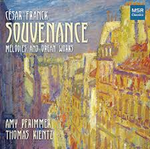|
Back
08/17/2017
“Souvenance”
César Franck: Roses et papillons, FWV 81 – Le Mariage des roses, FWV 80 – S’il est un charmant gazon, FWV 78 – Le Vase brisé, FWV 84 – Passez! Passez toujours!, FWV 82 – Souvenance, FWV 70 – Robin Gray, FWV 74 – Nocturne, FWV 85 – Les Cloches du soir, FWV 87 – Pour moi sa main cueillait des roses, FWV 83 – Aimer, FWV 76 – Ninon, FWV 71 – La Procession, FWV 88 – Pastorale in E major for Organ from “Six Pieces”, FWV 31, opus 19 – Fantaisie in A major for Organ from “Three Pieces”, FWV 35
Amy Pfrimmer (soprano), Thomas Kientz (piano and organ) – 72’20
Recording: Royaumont, Asnières-sur-Oise, France and Eglise Saint-Guillaume, Strasbourg, France (November 2015) – 72’20
MSR Classics MS 1638 – Booklet in English

   
Those taking to Amy Pfrimmer’s earlier churchly reading, “Eternal Life”, will find “Souvenance” a complimentary, secular fit of sorts. César Franck wrote 18 mélodies, set to text by some of France’s most revered literary figures, though they’ve been seldom performed nor readily archived within French compendiums to date. Ms. Pfrimmer selected 13 [pieces], allowing her voice to represent a variety of dramatic expressions pertaining to Franck’s evolution of emotional context. Furthermore, Strasbourg-based organist, Thomas Kientz, gives us evenly-tempered pianistic support in the œuvres while spotlighting his proficiencies on organ in three conclusive comments. Though the CD doesn’t lay out in chronology, the selections make for bounteous variety. Attempting to understand Franck’s musical “pathway” is best mapped out in chaptered format.
Early Franck: We begin with a gravity of purity and romantic tenor as it unfolds inside two wonderful songs: the pining Souvenance, a flashback souvenir, and the idyllically-charmed (though woeful) Robin Gray (personal favorite.) Within the latter, Ms. Pfrimmer’s arresting format tugs at listeners’ heartstrings. Set against flourishes by Jean-Pierre Claris de Florian, Robin Gray is a nano “mini novelette”: Amy Pfrimmer’s pulsating upper notes chart the story’s intensity with alluring conveyance; the voice abounds in exercised remarks as Mr. Kientz supplements contrasting moods and tempos on keyboard. Similarly, Franck’s 1849 gem, Aimer, permits [Pfrimmer’s] soprano voice to swell with comforting legato and rounded eloquence while mounting intensity builds within the Alfred de Musset Ninon. There is a shifting of major and minor “thoughts” that can be well-tracked through Thomas Kientz’s lovely roulades to enliven Victor Hugo’s words of hope inside Passez! Passez toujours!
Middle Franck: A more lightened experience and allure surrounds pieces such as S’il est un charmant gazon with elements of greater simplicity inside the elementary innocence of Le Mariage des roses. In the aforementioned, sounds stretch into particulates of grounded naïveté and unimpeachable chastity.
Late/mature Franck: One senses the Belgian's capitalization of the past by demonstrating foreboding darkness: Amy Pfrimmer makes a stronger case (i.e. Le Vase brisé) for those compositions destined with a deeper, soulful underpinning; the Nocturne is sulky and quasi-internally taciturn.
The last two sélections are devoted solely to organ, and here we witness Mr. Kientz’s professional acumen. Impressive an organist and improviser he was, César Franck maintained a close collaboration with Aristide Cavaillé-Coll, a man credited with building massive instruments for decorous dispersal. Franck went on to inaugurate many of these monoliths.
We have representations of how music must have been approached because Thomas Kientz performs three (3) works for organ on one of Cavaillé-Coll’s creations, located in the Royaumont Abbey: originally composed for voice and orchestra, La Procession has been transcribed for voice and organ. This is one of Franck’s most recognized and revered of mélodies. On the CD we find a Pfrimmer/Kientz concomitance to be appropriately stately and celestial. The subsequent Pastorale (superb) takes on an ABA pattern which features Mr. Kientz’s tapping into a brilliantly testy staccato middle theme. MSR Classics’ resonances emanating from M. Cavaillé-Coll’s pipes are richly ebullient, lending themselves to heavenly retreat. What follows in the Fantaisie is equally enthralling. Franck’s chording sweetly carries heavenward with an epiphany spiral that will interest organ enthusiasts.
Christie Grimstad
|